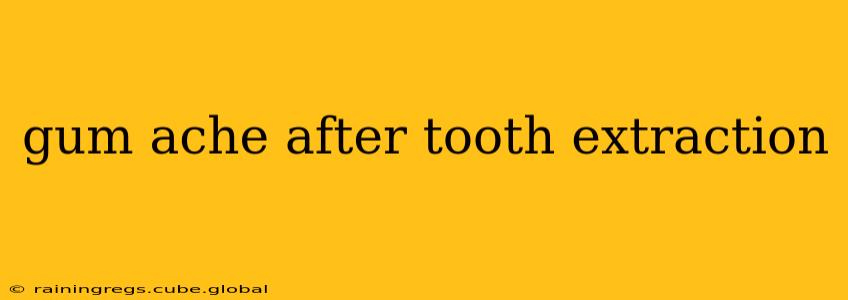A throbbing gum ache after a tooth extraction is a common experience, often a natural part of the healing process. However, understanding the causes, recognizing when it's a cause for concern, and knowing how to manage the discomfort are crucial for a smooth recovery. This comprehensive guide will address your post-extraction gum ache, providing you with the information you need for effective management and prevention.
What Causes Gum Ache After Tooth Extraction?
Several factors can contribute to gum ache following a tooth extraction. These include:
-
Inflammation: The extraction site is essentially a wound, and inflammation is a natural response to injury. This inflammation causes swelling and discomfort, which is often felt as a gum ache. This is usually mild and subsides within a few days.
-
Dry Socket: This is a more serious complication where the blood clot protecting the extraction site becomes dislodged or dissolves prematurely. This exposes the underlying bone and nerve endings, leading to significant pain, often described as a sharp, throbbing ache.
-
Infection: Bacterial infection at the extraction site is a possibility, causing intense pain, swelling, redness, and potentially pus. This requires immediate professional attention.
-
Residual Bone Fragments: Occasionally, small bone fragments might remain in the extraction socket, irritating the gum tissue and causing persistent pain.
-
Nerve Damage: While rare, damage to nearby nerves during the extraction process can result in prolonged or persistent pain.
How Long Does Gum Ache After Tooth Extraction Last?
The duration of gum ache varies depending on the individual and the complexity of the extraction. Generally, you can expect some level of discomfort for the first few days. Mild to moderate pain typically subsides within a week. However, persistent or worsening pain could signal a complication.
What Can I Do to Relieve Gum Ache After Tooth Extraction?
Managing post-extraction gum ache involves both over-the-counter remedies and careful adherence to post-operative instructions:
-
Over-the-Counter Pain Relievers: Ibuprofen or acetaminophen are commonly recommended for pain management. Always follow the dosage instructions on the packaging.
-
Rinsing: Gentle rinsing with warm salt water can help keep the extraction site clean and reduce inflammation. Avoid vigorous rinsing or swishing, as this could dislodge the blood clot.
-
Ice Packs: Applying ice packs to the affected area can help reduce swelling and numb the pain.
-
Rest: Adequate rest allows your body to focus on healing.
When Should I See a Dentist After Tooth Extraction?
Contact your dentist immediately if you experience:
- Severe pain that doesn't respond to over-the-counter pain medication.
- Excessive bleeding that doesn't stop after applying pressure.
- Signs of infection, such as increasing swelling, redness, pus, or fever.
- Numbness or tingling that persists for more than a few days.
- A noticeable gap in the healing process, with the hole not closing properly.
Is it Normal to Have a Gum Ache a Week After Tooth Extraction?
Some mild discomfort a week after extraction might be normal, particularly if there was significant trauma during the procedure. However, continuing or worsening pain requires professional evaluation to rule out complications.
How Can I Prevent Gum Ache After Tooth Extraction?
Following your dentist's instructions meticulously is key to preventing complications and minimizing gum ache. This includes:
- Careful oral hygiene: Maintain gentle brushing and flossing, avoiding the extraction site until it has healed.
- Following dietary restrictions: Avoid hot foods and drinks, hard or crunchy foods, and smoking to promote healing and prevent dislodging the clot.
- Staying hydrated: Proper hydration supports the body's healing process.
Can I Eat After Tooth Extraction?
Yes, but you need to consume soft foods initially to avoid any trauma to the extraction site. Gradually reintroduce firmer foods as the healing progresses.
This information is intended for general knowledge and doesn't replace professional medical advice. Always consult your dentist or oral surgeon for personalized guidance and treatment related to your specific situation. Remember, prompt attention to any unusual symptoms is crucial for optimal healing and preventing further complications.
